Life on planet Earth has been around for over 4 Billion years. That's a span of time us humans can barely comprehend. To put it into perspective - if Life started a year ago, the entire recorded history of human civilization would be covered in just the last second or two.
Over this time, there have been five great extinction events - when percentage of species died out. We are living through the sixth, and we are responsible for it. I touched upon this briefly in a recent post about how it is the only sore spot in how our World is getting better all the time, and felt this subject deserves more attention.
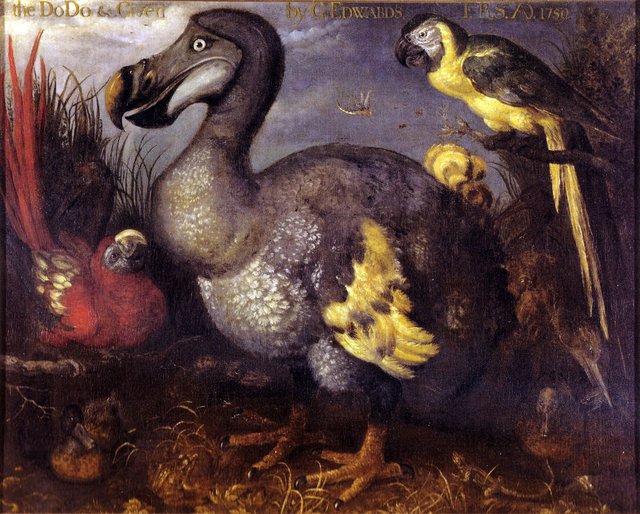
Mass Extinction Events
Species are going extinct and evolving into new species all the time. There's a background extinction rate, which has been very consistent for the last few million years.
Extinction events happen when the rate of extinction is alarmingly higher than the background extinction rate. Thus far, there have been 5 major extinction events. The last one was the fabled Cretaceous-Tertiary (K-T) extinction event, 65 million years ago. This is when non-avian dinosaurs was wiped out along with 70% extant species.
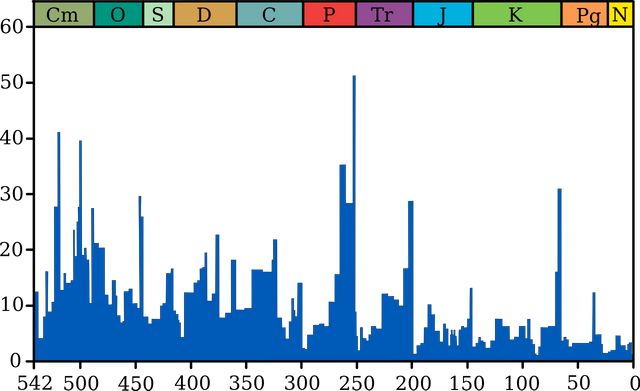
The massive spikes are the extinction events.
But there was an even more catastrophic extinction 250 million years ago - the Permian-Triassic (P-Tr). An astonishing 96% of all marine species went extinct! Over 70% of terrestrial plants and animals disappeared too, with 50% entire families went extinct. Aptly also called The Great Dying.
Extinction events happen due to massive changes in the temperature and composition of the Earth's atmosphere. This could be caused by various different factors - massive scale volcanism, large meteorite strikes, changes in plate tectonics leading to expelled gases en masse, and of course, activity by life forms themselves. From there a runaway feedback loop or snowball effect completely alters the composition of the planet, and the ecosystem fails spectacularly. What starts as 1% change soon ends up as 50%.
By massive scale, I mean the entirety of Siberia - an area greater than the USA - going up in lava for a million years. That is what caused The Great Dying.
Today, we are living through the sixth mass extinction event, the Holocene Extinction Event or the Anthropocene Extinction Event. We are just a couple of hundred years into it, and it's going to get very, very ugly.
Humans nearly went extinct recently
A little known fact is, about 75,000 years ago, there was a severe population bottleneck. Although a controversial idea lacking decisive evidence, it is likely this happened due to a supervolcano erupting over Lake Toba. There could have been as little as 10,000 surviving humans by the end of it - less than the number of active users on Steemit! Needless to say, many other species were affected as well, particularly mammals.
We are here today by the skins of our teeth.
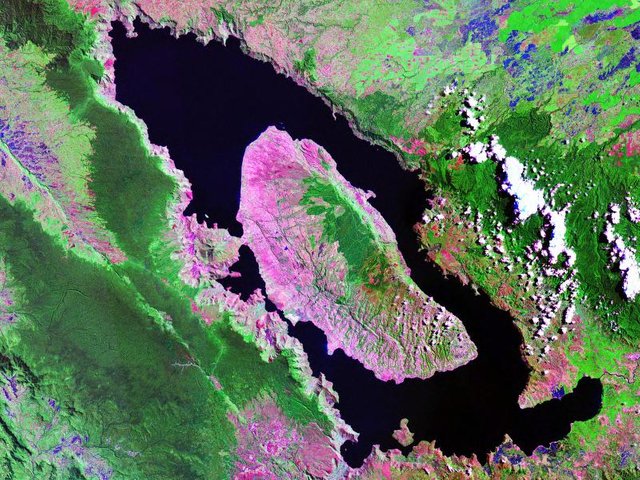
Lake Toba today - the whole lake is a massive crater hundreds of miles across.
The Holocene Extinction
I don't need to explain why the Holocene extinction is happening. It's obvious, right from hunting animals to cutting down trees during the Stone Age to dumping obnoxious amounts of CO2, we have played havoc on the environment for our own benefit. The end result is temperatures are going through the roof - both land and sea, the sea level is rising, natural ecosystems are disrupted and displaced, and in general, a vast majority of species struggling to survive.
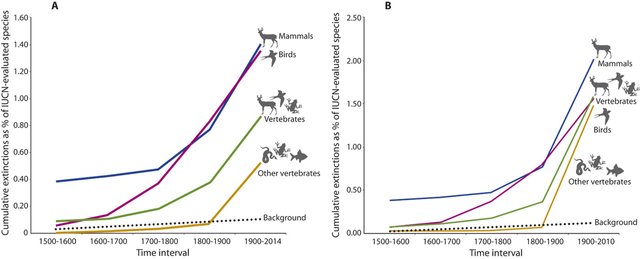
Very conservative estimate on the left, conservative on the right. The background extinction rate is under 0.10% extinction, we are encroaching on 2%.
The news is it's a lot, lot worse than we expect. Currently, the extinction rate is over a 100 times higher than the background extinction rate. This is the kind of numbers we look at when a mass extinction event is in its infancy. Remember, once the negative feedback loop kicks in, things get exponentially worse very, very quickly. If uncontrolled, we are in for an extinction event that lasts thousands of years and at least half as deadly as the K-T event.
Who is affected
Make no mistake about it - the planet Earth and Life will survive. Like it always has. It'll just be a very different planet.
Every living form is affected. But it's amphibians and mammals who are being hammered. Mammals came into prominence for having survived the K-T event. But now it's our turn to face the fate the dinosaur's did 65 million years ago. Birds have been going extinct at the rate of noughts as well.
It's the reptiles that are dealing with the situation best. Thousands of years from now, we may be seeing lizards and snakes dominating the planet Earth.
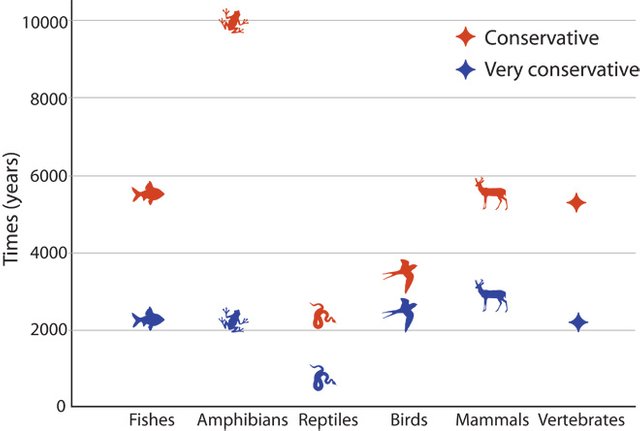
Number of years that would have been required for the extinctions over the last century. Once again, very conservative estimates.
So, what next?
A lot of damage we have done is irreparable. But we may just have hit the rock bottom in the last couple of years. There's a concerted effort around the environment now. This wonderful video from Al Gore lays down the cause for optimism.
One thing's for sure, however, the planet is not going to be sustainable for carrying the homo sapiens species long term. It's of paramount importance that we become a space faring civilization as soon as possible.
I know this was a complete downer and completely out of place on Steemit. I apologize. But I had to write this up. It just shows how fragile our existence is, and how we must cherish it and fight for its prolonged survival.
Sources:
Accelerated modern human–induced species losses: Entering the sixth mass extinction - http://advances.sciencemag.org/content/1/5/e1400253
(see for further sources)
NASA GISS - http://data.giss.nasa.gov/
Elizabeth Colbert - The Sixth Extinction
The Biology of Mass Extinction: A Palaeontological View - http://www.jstor.org/stable/2396929?mag=its-official-a-global-mass-extinction-is-under-way&seq=1#page_scan_tab_contents
Comparative Earth History and Late Permian Mass Extinction - http://science.sciencemag.org/content/273/5274/452.short
Subcomission of Quarternary Stratigraphy - http://quaternary.stratigraphy.org/workinggroups/anthropocene/
Supervolcano - The catastrophic event that changed the course of human history - John Savino; Marie D. Jones
A lot of Wikipedia
Thank you for posting this. This is the type of content Steemit needs more of and will help others take it more seriously as an important source of information.
Downvoting a post can decrease pending rewards and make it less visible. Common reasons:
Submit
I'm sure it will happen. I don't expect much of an audience for this compared to some of my posts about Steemit itself, but I'll keep doing it till there's an audience. The creator has to come first before the audience, even if there's no audience for a while. Other folks like @sciencenews are on it as well.
Downvoting a post can decrease pending rewards and make it less visible. Common reasons:
Submit
Capitalism considers mass extinction an externality. An inevitable consequence of the accumulation of wealth based on the unrestrained exploitation of natural resources; yet one which does not impede that very accumulation at present. It is the nature of capitalism to disregard systemic risks.
What ancaps fail to realize is that capitalism can not function without a state apparatus that guarantees its survival. There are few limits to the state's power over citizens, but the state can not dictate the laws of nature. A society can be coerced to assuming the financial risks of private enterprise, but there are forces in this world beyond the state's control...
We are fast at work degrading the planet's ability to sustain our existence, and we refuse to modify our behavior because our instinct for self-preservation demands we stay the course.
Downvoting a post can decrease pending rewards and make it less visible. Common reasons:
Submit
I had deliberately shied away from the politics behind this catastrophe in this post. It's a different can of worms! Perhaps you can write a separate post on that, I'll surely further the discussion.
It's obvious that free market capitalism is reaching its end. I think people realize that, which is why we see a strong movement towards progressive candidates around the world. Sanders in the US, Trudeau in Canada, Corbyn in the UK, Tsipras in Greece, in Spain etc. The Scandinavians, as usual, were way ahead of the curve. Of course, not all of them will (have) succeed in getting elected, but the movement is very clear. Sanders will never be President, but because of his efforts, someday someone like Elizabeth Warren will.
Wait, that's way off topic! But yes, it's the government's policies that have brought about this disaster.
Downvoting a post can decrease pending rewards and make it less visible. Common reasons:
Submit
I think its worth adding that Lake Toba's US equivalent, the Yellowstone Caldera, is geologically overdue for an explosion that would thrust the world into nuclear winter, after killing a significant portion of the population.
And I bet it isn't long before big oil and fracking decide to drill there because money.
Downvoting a post can decrease pending rewards and make it less visible. Common reasons:
Submit
You are absolutely right. You'll see the book "Supervolcano" I've sourced from - the last quarter of the book is about how Yellowstone Caldera is the next Lake Toba that is inevitably going to happen. It could be tomorrow, it could be a hundred thousand years. Either way, today's extinction is down to anthropogenic activity.
Downvoting a post can decrease pending rewards and make it less visible. Common reasons:
Submit
Sure is, for the time being. But then again, a big rock could show up out of nowhere, or one of those carrington event solar flares could thrust us to the Stone Age. Great write up either way, hopefully we're long gone before the end arrives haha
Downvoting a post can decrease pending rewards and make it less visible. Common reasons:
Submit
We will be gone, of course. But that's the line of thought that got us into this mess in the first place. :)
Downvoting a post can decrease pending rewards and make it less visible. Common reasons:
Submit
Once our sun goes Red Dwarf (great show by the way), we'll all move on. I just hope we can learn how to keep the planet livable until then, so we can get to high level technological advancement and populate the galaxy. I'm thinking something like a "Firefly" future ;) But I'll take a "Dark Matter" future too
Downvoting a post can decrease pending rewards and make it less visible. Common reasons:
Submit
(Posting here as run out of space)
Well, you really are on an entirely different tangent now! Sun going Red Dwarf is several billion years away. Don't worry, human beings will be gone within a million years. Either evolved into a new species or extinct.
Looking at the astronomical (sorry, bad pun) progress we have made in the last 150 years, I bet we can terraform Mars within a few centuries.
Downvoting a post can decrease pending rewards and make it less visible. Common reasons:
Submit
I don't want to detract from your post at all, because I think it's an excellent presentation of our predicament. You use only the most incontrovertible evidence to back up your argument. But I think in your attempts at restraint, you understate the magnitude of the crisis.
According to the Center for Biological Diversity:
I wish it were only 100 times, as you suggest! We are exceeding that by orders of magnitude.
Downvoting a post can decrease pending rewards and make it less visible. Common reasons:
Submit
During my research, I did read through Center for Biological Diversity. However, their numbers were a bit higher than the consensus. I totally understand why they are doing it though, we are much more bound to take notice the larger and more shocking the numbers are. Given how dire the situation is, they are doing the right thing.
Given the nature of a blog post, it's necessary to boil it down to one data set which I find is most consistent, and for this, it was the first paper linked in the Sources. This paper has also been peer-reviewed extensively.
Remember, scientists are always conservative on these matters. And I have made it clear more than once that these are very conservative estimates. On the other hand, given this a blog post, perhaps I should have not been as conservative as a scientific paper. Point taken.
Downvoting a post can decrease pending rewards and make it less visible. Common reasons:
Submit
Yeah, advocacy groups are going to use research that supports their position and not necessarily the most widely accepted findings. But also, in comparing the two studies, it seems like the 100 times figure is specifically for vertibrates. Other species are likely experiencing higher rates of extinction. There is something to be said for digging a little deeper than the headlines.
Like I said, I thought your post was great and it wasn't my intention to argue the point. I just wanted to note that you weren't being alarmist, although the subject matter is alarming. But the research you highlighted was among the most conservative.
Downvoting a post can decrease pending rewards and make it less visible. Common reasons:
Submit
I was trying hard not to be an alarmist, and I see why that may have been a misguided approach.
Like I said in another reply here, I plan to write a follow up once there's more peer-reviewed data about the extinction of plants. It's a bit of an unknown at this point but the first indications are they are affected much worse than vertebrates. I'll keep whatever you have said in mind and be much more of a downer next time. :)
Downvoting a post can decrease pending rewards and make it less visible. Common reasons:
Submit
I quote from Dane Wigington's site geoengineeringwatch.org:
Fully 200+ species of plants and animals are being lost to extinction each and every day. This rate is 10,000 times “natural variability” which is 1,000,000% of “normal” background extinction rates.
Source: http://www.geoengineeringwatch.org/life-on-earth-is-in-virtual-freefall/
Wigington lays out scientific data supporting all of his assertions. I have not looked too closely at Al Gore's ideas but I'm sure the two men would differ widely on several points.
Gore is an insider handsomely rewarded for conceding the 2000 election to George Bush. Wigington is by all accounts just a concerned citizen.
Downvoting a post can decrease pending rewards and make it less visible. Common reasons:
Submit
Thanks! I had missed out on that article, though it is a couple of years old.
To be frank, I only left that Al Gore speech there as that was the only positive thing I could find amidst a whole of doom and gloom. Gore's figures are accurate and peer-reviewed, but even the most robust reforms aren't going to prevent this mass extinction. All we can hope to do is make sure it's not as deadly as the K-T event.
Also, I'm planning a follow-up post later in the year - I expect there will be more data about extinction of plant species. I expect plant extinction to be much worse than those of vertebrates.
Downvoting a post can decrease pending rewards and make it less visible. Common reasons:
Submit
Ok I'll be watching for the follow-up article. Meanwhile, today (August 5th) in Redding, California there was a "Public Awareness Event" ( http://www.geoengineeringwatch.org/major-northern-california-vaxxedclimate-engineering-public-awareness-event/ ) .. so I expect video from the event to be available soon.
Downvoting a post can decrease pending rewards and make it less visible. Common reasons:
Submit
Yes, I have been following that - will watch the video when available.
Downvoting a post can decrease pending rewards and make it less visible. Common reasons:
Submit
I really doubt a volcano could affect the life of all humans without affecting all life on earth, maybe on a specifical done it could do a great damage.
Eitherway I do agree that we are extinguishing races at a very fast rate, maybe we become aware on time.
Downvoting a post can decrease pending rewards and make it less visible. Common reasons:
Submit
Of course, other animals were affected by Lake Toba too! Especially other mammals. Let me edit the post to make that clear. Thanks for pointing it out.
Downvoting a post can decrease pending rewards and make it less visible. Common reasons:
Submit
Was too damn high there, I do remember seeing a documentary about supervolcanos (last time I read volcanos only), I actually remembered it because @prufarchy's mention of the Yellowstone Caldera.
Downvoting a post can decrease pending rewards and make it less visible. Common reasons:
Submit
Amazing post. I love it. I want to see more.
It's a downer, but knowing this means we can work to change the outcome and deal with the dramatic effects.
We've got communities in remote places working tireless to adapt.
https://steemit.com/science/@reneenouveau/the-rekindling-of-ancient-ways-is-key-to-surviving-climate-change
The folks in the Micronesian Outer Islands are just one of the communities around the world taking steps to adjust to the Anthropocene.
Annalee Newitz's book title about extinction level events gives us the the foundational blueprints in three simple words: "Scatter, Adapt, and Remember". To me that means Diversify, Anticipate, and Look back to our human and biological history!
My personal motto: We need to plant the forests to survive the Anthropocene now!
Downvoting a post can decrease pending rewards and make it less visible. Common reasons:
Submit
Firstly, that was a great post! Sorry to see it get lost in the void - the same has happened with many of my other posts. Perhaps you can repost it after a bit.
I'll surely check out the book. It's unrealistic for humans to go back our primitive origins entirely, but we can definitely cut back vastly on our voracious consumption of resources. Particularly the USA. Vaclav Smil's incredible book "Harvesting the Biosphere" estimates that if there were 1.5 billion (I could be wrong! just my recollection) Americans, the world ecosystem will shut shop. But this is another tangent entirely. :)
Downvoting a post can decrease pending rewards and make it less visible. Common reasons:
Submit
Good, we should be wiped out already :)))
Downvoting a post can decrease pending rewards and make it less visible. Common reasons:
Submit
And I thought I was being a downer. :)
Downvoting a post can decrease pending rewards and make it less visible. Common reasons:
Submit
Hehehe
Downvoting a post can decrease pending rewards and make it less visible. Common reasons:
Submit
Downvoting a post can decrease pending rewards and make it less visible. Common reasons:
Submit
This is crazy liber. Great post I knew it was bad but not as bad as this. Sadly it will probably continue until its too late.
Downvoting a post can decrease pending rewards and make it less visible. Common reasons:
Submit
There's no turning back. I think a realistic goal right now is to take drastic measures and cap the extinction rate at 10% or so. It'll take thousands of years for the global ecosystem to recover from there.
Downvoting a post can decrease pending rewards and make it less visible. Common reasons:
Submit
If you say "it's obvious", then it must be true.
Downvoting a post can decrease pending rewards and make it less visible. Common reasons:
Submit
I only say obvious when there's overwhelming peer-reviewed evidence by the scientific community.
Downvoting a post can decrease pending rewards and make it less visible. Common reasons:
Submit
Downvoting a post can decrease pending rewards and make it less visible. Common reasons:
Submit